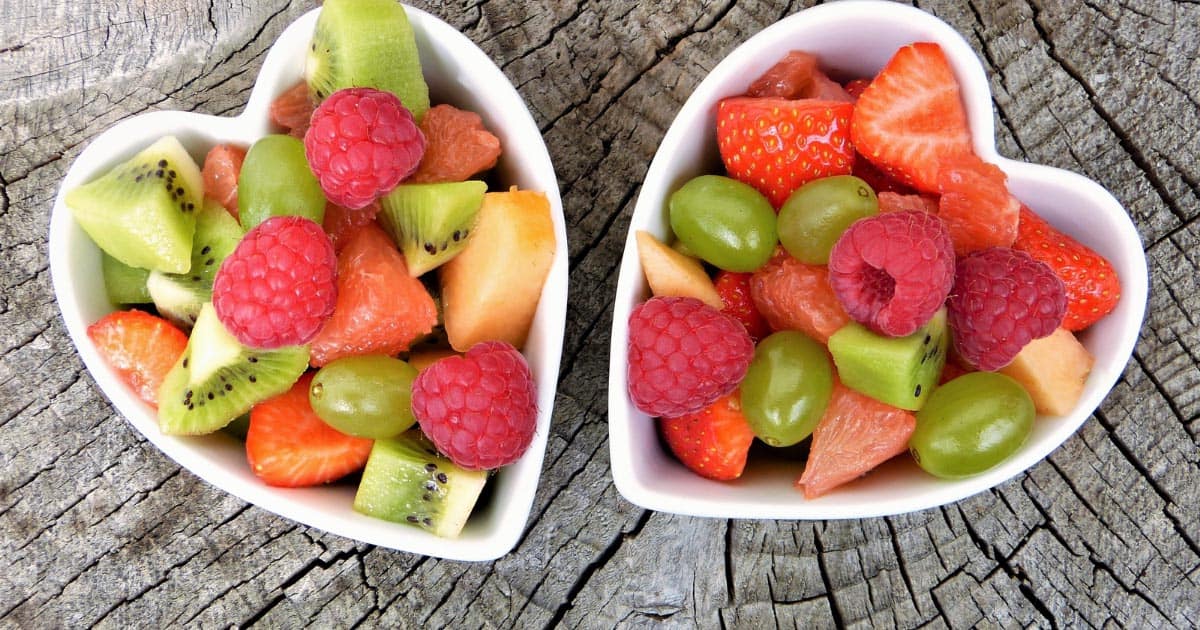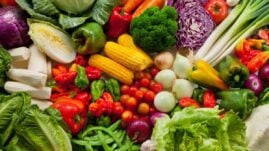While fruit can definitely be part of a healthy diabetes diet, it’s important to know the differences between the fruits you’re choosing. A handful of blueberries will have a much different impact on your blood sugar than a handful of grapes.
In this article, we’ll look at the types of sugar in fruit, which fruits raise blood sugar levels the most, and which fruits raise blood sugar levels the least.

What’s the sugar in fruit: fructose, glucose, or sucrose?
We’re often taught that all fruit contains “fructose” versus “sucrose” and that this means it’s better for our blood sugar levels. But the truth is that fruit contains a combination of fructose, sucrose, and glucose.
Fructose in small amounts (such as from a piece of fruit) is well processed by the liver and thus does not impact your blood sugar — so it’s true that many fruit choices have less impact on your blood sugar than white table sugar (sucrose). However, it’s the content of glucose in a fruit that matters most.
In the chart below, you’ll see that cherries and grapes contain significantly more glucose than berries, apples, and bananas. But you’ll see that bananas and apples (which can also raise blood sugar levels) also contain a great deal of sucrose.
| FRUIT | Glucose grams | Fructose grams | Sucrose grams |
| apple | 2.3 | 7.6 | 3.3 |
| banana | 4.2 | 2.7 | 6.5 |
| blackberries | 3.1 | 4.1 | 0.4 |
| blueberries | 3.5 | 3.6 | 0.2 |
| cherries | 8.1 | 6.2 | 0.2 |
| grapes | 6.5 | 7.6 | 0 |
*The values in the chart are based on the Nutritionist V Database.
What about high-fructose corn syrup?
When it comes to high-fructose corn syrup, the reason it’s significantly different than fruit-derived fructose is that the amount of processed fructose is a direct cause of fatty liver disease and high triglyceride levels.
These are both components of health that increase a person’s risk for type 2 diabetes and other metabolic diseases.
A recent study reviewed by the University of South Carolina explained that “countries that use high-fructose corn syrup in their food supply had a 20 percent higher prevalence of diabetes than countries that did not use it,” along with a “significantly increased prevalence of diabetes” despite lower rates of obesity.
So, when reading the ingredients on a packaged item, don’t confuse high-fructose corn syrup with its more natural form of simple “fructose.”
Fructose is what is found in whole, real fruit — not a packaged product or soda or candy.
5 fruits that will raise your blood sugar the most
Just because a type of fruit is on this list does not mean you can’t eat it. However, when choosing the fruits on this list, it’s important to keep an eye on just how much you’re eating.
In general, if you’re trying to avoid fruits that contain the most carbohydrates that will impact your blood sugar, aim for berries of all kinds!
Here are 5 fruits to eat with careful consideration and extra attention to your blood sugar:
Grapes
“I like to call grapes ‘sugar bombs,’” says Jennifer Smith, RD & CDE from Integrated Diabetes Services.
Grapes actually top the chart of fruits containing the most total sugars. A mere 5 or 6 individual grapes can impact your blood sugar as if you just ate 2 apples.
1 cup of red or green grapes contains 27 grams of total carbohydrate and 26 grams of net carbs.
Cherries
Cherries are so fun to eat but you’ll want to be careful because it’s easy to consume 10 or 15 in a snacking moment — and they definitely impact your blood sugar.
Ranking second on the list of total sugars, 1 cup of sweet, raw cherries can pack 23 grams of total carbohydrate and 20 grams of net carbs. But if you picture how many whole cherries fit in one cup…it’s only 4 or 5 actual cherries!
Bananas
Bananas are often thought of as the healthiest fruit for your blood sugar because they have a reputation of being a “complex carb” versus a “simple carb” like grapes — but bananas contain both complex and simple carbs.
1 medium banana contains about 27 grams of total carbohydrate and 24 grams of net carbs. The only difference is that they might take a little longer to raise your blood sugar compared to fruit like grapes.
Pineapple
You know that delicious tart flavor of pineapple? That’s partly a reflection of its very sweet sugar content.
Also a common source of juice, pineapple is a very sugar-heavy fruit choice, with 1 cup of cubed pineapple containing 22 grams of total carbohydrate and 20 grams of net carbs. In fact, one of those teeny tiny cans of pineapple juice could easily treat two low blood sugars. Super sweet!
Dried fruits (of any type)
When it comes to diabetes and eating dried fruits — watch out. The carb count in dried fruit is no joke.
Raisins, for example, are often touted as a healthy alternative to chocolate chips when baking cookies — but a 1/2 cup of raisins contains 57 grams of total carbohydrate and 55 grams of net carbs. Sugar that’s about 12 grams less than chocolate chips but it’s still a whopper of a snack compared to eating fresh fruit.
Do keep in mind — when eating any dried fruits — that many have added sugars to compensate for tartness. Cranberries are rarely served or packaged without added sugars.
When it comes to blood sugar management, eating the fresh fruit version is almost always going to be a better choice than its dried version.
If you choose to include these options in your diet, do so with moderation and careful attention to your medications and blood sugar levels.
10 lowest-carb fruit choices for people with diabetes
When it comes to labeling a fruit as “low-carb,” it’s all relative, because fruit simply is a source of pure carbohydrates. This list includes the top 10 fruit (and berry) choices that contain the least carbs, making them the ideal options for people with diabetes.
Raspberries
Raspberries are one of the most seemingly elegant fruits — and they’re usually pretty expensive. They’re also remarkably low in carbohydrates after subtracting the fiber.
In fact, you might even find that a small handful doesn’t impact your blood sugar at all. 1 cup of fresh raspberries contains 15 grams of total carbohydrate and only 7 grams of net carbs!
Blackberries
If raspberries are a little too tangy for you, blackberries are a great alternative and equally low-carb. 1 cup of fresh blackberries also contains 15 grams of total carbohydrate and only 7 grams of net carbs.
The only downside is that blackberries tend to be one of the pricier fruits at the grocery store.
Blueberries
Blueberries are usually affordable and relatively low-carb. 1 cup of fresh blueberries contains 21 grams of total carbohydrate and 18 grams of net carbs.
Just be careful while eating because it’s very easy to eat 2 cups of blueberries while mindlessly watching T.V. And 2 cups will definitely make themselves apparent in your blood sugar.
Strawberries
The great thing about strawberries is that they are very filling and relatively large compared to other berries. 1 cup of whole strawberries contains 11 grams of total carbohydrate and 8 grams of net carbs.
A few strawberries go a long way when it comes to snacking on them for a healthy dessert after dinner or slicing a few into your chia-seed pudding for extra sweetness and flavor.
Plums
Plums are small, but making a snack out of one or two is a pretty flavorful way to enjoy fruit without much impact on your blood sugar.
1 fresh plum contains about 7 grams of carbohydrates and 6.5 grams of net carbs. The only tricky part is waiting for them to ripen in your fruit basket! Plums require patience!
Tangerines
Tangerines (and clementines) are a good choice of citrus if you’re trying to keep the carb count low. But do keep in mind that you’re crossing over into the world of very juicy fruits, and you will see the impact on your blood sugar.
1 medium-sized tangerine 12 grams of total carbohydrate and 10 grams of net carbs.
Grapefruit
Again, keep in mind that while citrus ranks low on the relative carb-quantity list, you’re still consuming something containing plenty of juice, and you will see that impact on your blood sugar.
1 medium-sized grapefruit contains 21 grams of total carbohydrates and 18 grams of net carbs.
Considering the size of a grapefruit — and the amount of time it takes to eat it — that’s a pretty satisfying snack at 18 grams of carb.
Peaches
Peaches! My favorite fruit on this list, for sure. An in-season and perfectly ripe peach is a treat.
1 medium-sized peach contains 15 grams of total carbohydrate and 13 grams of net carbs. Definitely sweeter than berries, but every bite is full of wonderful texture and flavor.
Honeydew Melon
When it comes to melon, you get a lot of bulk for fewer carbs compared to many other fruits.
1/8 wedge of honeydew melon contains 11 grams of total carbohydrate and 10 grams of net carbs. This means you could eat half an entire honeydew melon in one sitting (which I often did during my first pregnancy) for only about 34 grams of net carbs.
A pretty big snack for relatively few carbs.
Papaya
Perhaps harder to find in the average grocery store unless you’re living on the US West Coast or in the deeper southern hemisphere, papaya definitely qualifies for the lower-carb list.
1 cup of cubed papaya contains about 14 grams of total carbohydrate and 11.5 grams of net carbs.
There are so many wonderful fruits out there — and many other low-carb exotic ones we didn’t list (like Starfruit).
When it comes to eating any type of fruit, look up the carb count, and check your blood sugar within 2 hours after eating to see the impact on your blood sugar.




Angelo Ferraro
Wy I test in the morning it’s fine around 6, I go for a walk 4km tests again ‘7.1
Go to the gym 40. Minutes test agin a bit more 7.3
Angelo
Pramod
Watermelon 🍉 is missing. The reason I ask is there are conflicting views!!
Could one have a Bowl of Cut WM ,50 GM’s in between meals?
One also needs to keep in mind the vital vitamin benefits from consuming fruits like Banana, . Please advise
Cynthia Lilly
I would appreciate knowing the amount of fiber in the low-carb fruits. Aren’t we supposed to subtract the fiber from total carb to calculate insulin?
Christel Oerum, MS
You can look up the fiber content either on Google or apps like MyFitnessPal. I like MyFitnessPal since it’s free and I find it easy to use.
I subtract fibers for insulin dosing, so it’s also something I pay attention to
bob
Generally speaking, most tree fruit is bad for those watching their BG, but most ground fruit is good. Keeps it simple.
mary
Actually — this list is WAY over simplified. I just lost 20lbs, not kidding, – and ate two large nectarines a day, (in the afternoon when I needed a bit of a pick-up.) I did NOT eat overly ripe, soft nectarines that drip juice all over your face – but very firm ones (trick is to get firm ones with as much red on skin as possible), that I cut pieces out of with a Knife. I love red grapes too but ONLY buy them when they are Hard. IE — the same kind of fruit has a wide range of Glycemic value depending on how overly ripe or firm it is! The classic case is bananas — if you eat one that is very firm with partially green skin, it is a beneficial starch, — but the soft “ripe” ones are like a mouthful of sugar. I have Never liked “ripe” soft and gushy fruit – even as a child — which fits my over all distaste for sugary anything. Because I ate so much Fruit, (a Major trick here for those trying to give up sugar!), I had NO DESIRE for CANDY or SUGAR SWEETS!
Todd
Net carbs are off and links are directed to the wrong fruits. In the case of blueberries, net carbs per cup is actually 17.8, not the 4 you site here. Doesn’t sound like much unless you’re doing keto.
Tobias Oerum
Thank you. We fixed the links. Where did you see net-carbs that were off? Blueberries are listed as 18 g net carbs.
Piper
If you reread the post she says 18 net carbs on blueberries.
“Blueberries are usually affordable and relatively low-carb. 1 cup of fresh blueberries contains 21 grams of total carbohydrate and 18 grams of net carbs.”
Sandra McGrath
I was shocked when my Dr suggested I cut back on my fruit intake..I ate a lot in a day..I am hoping my diabetes drops now I have changed my eating habits.
Thank you for this eye opener..
Mojoblogs
I have always been a fruit lover. I love eating it as a snack, instead of unhealthy foods. Not just a big fan of bananas, but I love pineapple, papaya, strawberries, and grapes. Love this list! Thank you for sharing this, very helpful especially to those who are on a strict diet due to diabetes 🙂
Kelani Anastasi
Hi Ginger, I’m a low-carb practitioner for three years. I love your list of fruits with little sugar content. I’ve been dying to taste fruits that will not consume my allowable sugar and carb intake, I bookmarked this post for my future reference. Btw, I love PAPAYA!!! It has a lot of fiber and it helps with my bowel movements. Looking forward to more articles like this, it helps us, low carb practitioners, to lessen our research works.